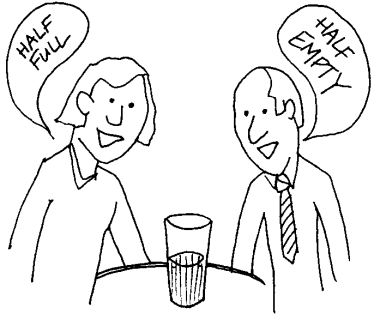Journal #2
Chapter 14
History & Systems
Chapter 14 is about the psychology behind our perception, which is the study of our senses. While at a first glance our senses seem very basic, there are a number of steps our brains go through to provide us with the information we need on a daily basis to function. For example for sight, it is a multi-step process just to determine if we recognize an image, while to us it feels almost instantaneous. First, we have to receive the stimulus, then the image is reflected and transformed to enable us to see it, next the image is processed by the receptors in our eyes, then the image gets processed by our brain, which leads us to determine if this is a new stimulus or a recognized one, which determines the action we take. Our brains are doing these processes countless times every day, and we barely notice or think about it. It also goes even deeper when you take into account something like speaking with another person. You're not only just seeing the person, but you're also reading their body language while speaking to pick up on any nonverbal cues, or your eyes are reading lips to help if you mishear any words said.
Elements of Thought
An important concept is the interpretation of sensory information, and how widely it can vary from person to person. As we grow and learn, we determine what things are appealing to us, and what things we dislike. But these things vary from person to person, where it's rare that someone will interpret something the same way you do. Everyone's perception is different, what seems like gibberish to one person may make perfect sense to another.
Point of View is very important when it comes to discussing perception and our sense. Because everyone has a different point of view in life, everyone has different interpretations of various stimuli in life.
Information is a key thing when it comes to perception. Information is what we use to perceive stimuli. We receive information in the form of stimuli that reach one of our 5 senses, and then we interpret and transform that information into sensory information to determine our actions. There are such things as too little information, where we do not have enough to be able to form solid conclusions or plans of actions, and there are also forms of too much information where too intensive or being bombarded by too many stimuli can cause our senses to feel overloaded. This explains how at times we may not be able to see things that are actually right in front of us, because we are using most of our resources to see the big picture, it becomes harder to focus in on something specific.
History & Systems
Chapter 14 is about the psychology behind our perception, which is the study of our senses. While at a first glance our senses seem very basic, there are a number of steps our brains go through to provide us with the information we need on a daily basis to function. For example for sight, it is a multi-step process just to determine if we recognize an image, while to us it feels almost instantaneous. First, we have to receive the stimulus, then the image is reflected and transformed to enable us to see it, next the image is processed by the receptors in our eyes, then the image gets processed by our brain, which leads us to determine if this is a new stimulus or a recognized one, which determines the action we take. Our brains are doing these processes countless times every day, and we barely notice or think about it. It also goes even deeper when you take into account something like speaking with another person. You're not only just seeing the person, but you're also reading their body language while speaking to pick up on any nonverbal cues, or your eyes are reading lips to help if you mishear any words said.
Elements of Thought
An important concept is the interpretation of sensory information, and how widely it can vary from person to person. As we grow and learn, we determine what things are appealing to us, and what things we dislike. But these things vary from person to person, where it's rare that someone will interpret something the same way you do. Everyone's perception is different, what seems like gibberish to one person may make perfect sense to another.
Information is a key thing when it comes to perception. Information is what we use to perceive stimuli. We receive information in the form of stimuli that reach one of our 5 senses, and then we interpret and transform that information into sensory information to determine our actions. There are such things as too little information, where we do not have enough to be able to form solid conclusions or plans of actions, and there are also forms of too much information where too intensive or being bombarded by too many stimuli can cause our senses to feel overloaded. This explains how at times we may not be able to see things that are actually right in front of us, because we are using most of our resources to see the big picture, it becomes harder to focus in on something specific.



Comments
Post a Comment